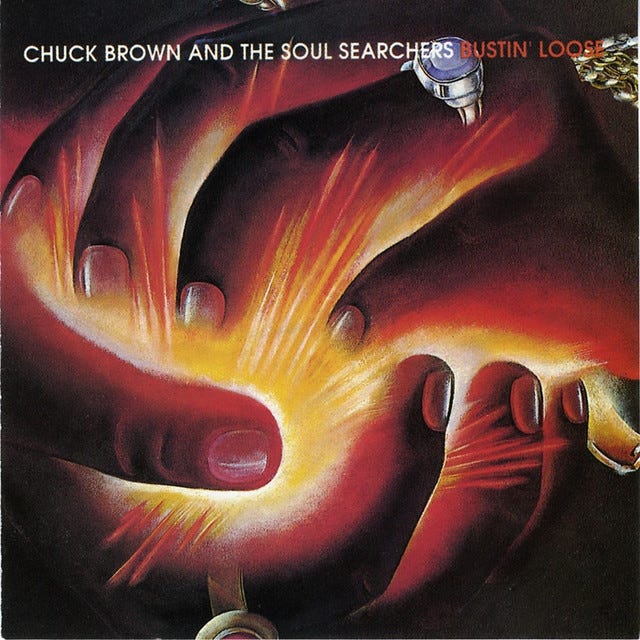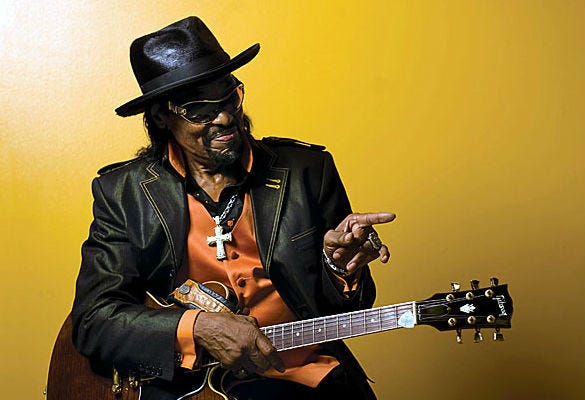Genre of the Day - Go-Go
Album of the Day - Bustin’ Loose by Chuck Brown & the Soul Searchers (1979)
The marbled halls of the District of Columbia surround political dysfunction with a stately exterior, a reality that has only been exacerbated in recent years by gridlocks and increasing polarization hindering progress and dialogue. It’s only getting more head-shaking as a new troop of human worms, some with brainworms, wriggle in. Today, Congress introduced a bill that would slash the Department of Education, throwing out the iPad babies with the bathwater and dooming a COVID-stunted generation to further lack of educational opportunities. It’s only the first major move in an impending bureaucratic razing of institutions Americans have broadly accepted and benefitted from for decades.
If we look into the realm of music, though, there is a considerably more stable DC institution that has been doing the work of groove-making for as long as some cabinet departments have been doing lawmaking. That would be go-go music. Washington DC is home to the largest Black American community by percentage in the US, and go-go music has emerged as a beloved flag-bearer for Black music and culture in the district. Borrowing its name from ‘60s go-go clubs that became synonymous with all-out dancing nights in records like the Miracles’ “Going to a Go-Go,” go-go music developed out of blues and funk through rhythmic innovation.
Guitarist Chuck Brown had played with a Latin band in the ‘60s, and had a fine-tuned ear for percussive detail: he noticed how the congas brought out rhythmic spunk, and was smitten with the slow-and-steady yet grooving jazz percussion of Grover Washington Jr.’s “Mister Magic.” He incorporated these touches into his band’s live act, laying a rhythm that came to overarchingly define go-go’s sound: a syncopated, interlocking mix of quarter and eighth notes played by prominent bass drum and snare with congas, timbales, and cowbells. An intensified brass section added further heat and an organic touch as funk moved in more electronic directions in other regions. Go-go’s decades of popularity in DC is also probably owed to call-and-response vocals that foster an intense artist-audience connection, like funk cheerleaders motivating dancers to stay on the floor for longer and longer.
Go-go music’s reach beyond its core DC funk-stitutents has been relatively less than other dance genres that emerged out of the era, though the producer Rich Harrison made it go-go on the charts in the early 2000s. His collaborations with Beyoncé (“Crazy in Love”, “Freakum Dress”) and Amerie (“1 Thing”) became smashes, shattering the tinkly R&B dominant in the moment with go-go’s blaring horns and driving percussion. Nelly’s ubiquitous “Hot in Herre” also sampled the title track from today’s album.
Save for a couple of stolid ballads that don’t feature the iconic go-go beat, Chuck Brown and his Soul Searchers’ 1979 Bustin’ Loose prioritizes the groove in the hierarchy of needs above all else from the first track. The beat is a language of its own, prompting one to dance where lyrics can only attempt to capture its potency. The rhythm speaks through him: “I said sha-la, get it, y'all say (ro-cha-mo down).” That rhythm brings out the best in instrumentalists—the irresistible trumpet licks of “If It Ain’t Funky” are even more unfettered, the bass and electric guitar rolling off melodies like dice. The snares of “Game Seven” sizzle with funky assuredness, giving our guitarist and bandleader the canvas to paint improvisational melodies with a liberty that suits DC values better than the current trajectories of select non-musical collectives elsewhere in the city.
Bonus: Rare Essence, a group that has taken up the mantle for go-go in the past two decades, on NPR’s Tiny Desk.







An important but not always recognized form of funk music.